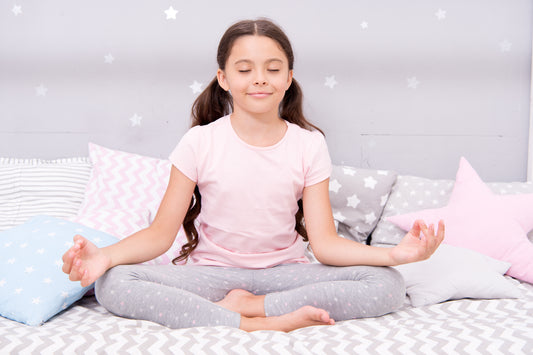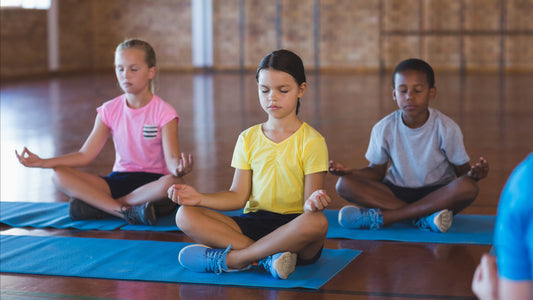Introducing meditation to children at an early age can provide them with invaluable life skills, enabling them to navigate the ups and downs of life with greater resilience and self-awareness. Through regular practice, kids can reap a multitude of benefits, including improved focus and attention, reduced stress and anxiety, better self-regulation, improved sleep, increased mindfulness, and enhanced academic performance.
10 benefits that children can experience from practicing meditation:
1. Enhanced Emotional Regulation
Children who meditate regularly develop a greater ability to manage their emotions, including stress, anxiety, and anger. They learn to recognize and label their emotions, allowing them to respond rather than react impulsively. This improved emotional regulation can lead to reduced outbursts, better decision-making, and a more balanced emotional state.
2. Improved Focus and Attention Span
Meditation helps children cultivate focused attention, enhancing their ability to concentrate on tasks and reduce distractions. This improved focus can translate into better academic performance, increased productivity, and a greater sense of presence in daily activities. Did you know it can help kids with ADHD as well?
3. Increased Self-Awareness
Regular meditation practice promotes self-awareness, enabling children to gain a deeper understanding of their thoughts, feelings, and motivations. This enhanced self-awareness fosters self-acceptance, self-compassion, and a stronger sense of self-identity.
4. Prompts Sleep Quality
Meditation can significantly improve sleep quality in children, reducing nighttime restlessness and anxiety. By calming the mind and body, meditation promotes relaxation and prepares children for a restful sleep. Learn more about meditation for sleep here.
5. Boosts Self-Esteem
The practice of meditation nurtures self-acceptance and self-compassion, leading to increased self-esteem in children. As they learn to observe their thoughts and feelings without judgment, they develop a more positive self-image and a stronger belief in their abilities.
6. Enhances Resilience and Coping Skills
Meditation equips children with valuable coping skills to navigate challenges and setbacks. By learning to focus on the present moment and manage their emotions effectively, they develop resilience in the face of difficulties.
7. Promotes Empathy and Compassion
Meditation cultivates empathy and compassion in children, helping them understand and connect with the feelings of others. This enhanced empathy fosters positive social interactions, stronger relationships, and a greater sense of interconnectedness.
8. Improves Decision-Making Ability
By enhancing focus and self-awareness, meditation empowers children to make more informed and thoughtful decisions. They learn to pause, consider their options, and act with greater clarity and intention.
9. Reduces Impulsivity and Promotes Mindfulness
Meditation helps children develop mindfulness, enabling them to be more present in the moment and less reactive to external stimuli. This mindfulness reduces impulsivity and promotes thoughtful, intentional actions.
10. Cultivates Inner Peace and Well-being
Overall, meditation nurtures inner peace and well-being in children, providing them with a sense of calmness, balance, and emotional stability. This inner peace enhances their overall quality of life and lays the foundation for resilience and well-being throughout their lives.
Find out how often your child should meditate.
To read more about mindfulness and meditation for kids, visit our BLOG.




